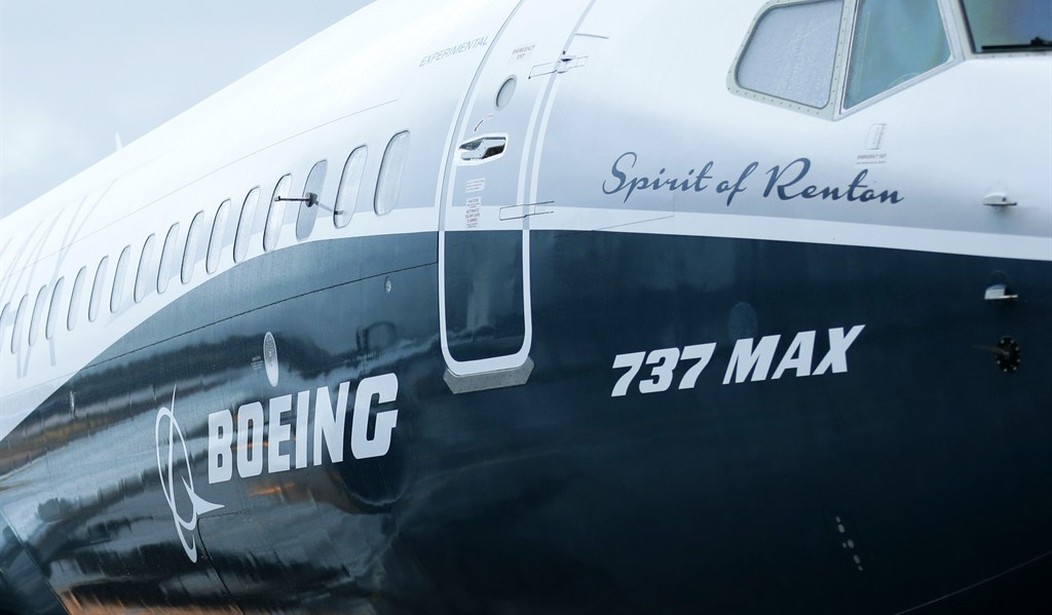Another day, another headline about serious safety issues at the once-great aircraft company called Boeing.
There's a much bigger story here, but I'll get to that momentarily.
First, though, Reuters reported earlier this week that the D.C.-area-based aircraft manufacturer has withdrawn its bid for a safety exemption on its MAX 7 airliner. The MAX 7 is yet another variation on the company's vaunted 737, which first flew passengers in 1968 — and its age is no slight. The '37 is a helluva platform, developed at a happier time for the company.
Sen. Tammy Duckworth (D-Ill.), who chairs a Senate subcommittee on aviation safety, announced last week that she opposed the exemption due to "an anti-ice system that can overheat and cause the engine nacelle to break apart and fall off. This could generate fuselage-penetrating debris, which could endanger passengers in window seats behind the wing."
Yeah, let's not rush the MAX 7 into service, fellas. We already saw what happened when Boeing put the MAX 9 into service without jumping through all the proper hoops, and the results were deadly crashes in 2018 and '19. Even after the fleet was grounded and finally recertified, we're still seeing incidents like last week's when a door plug panel flew off an Alaska Airlines jet in flight.
It's so bad that former Boeing senior manager Ed Pierson told the Los Angeles Times on Tuesday, "I would absolutely not fly a MAX airplane."
Readers here and at Instapundit have had the discussion time and again about how putting the finance people in charge ruined a once-great engineering firm, but I realize now that the rot runs even deeper. While the company's fortunes burn, management sits there with its coffee and stock options, saying, "This is FINE."
Aviation Week recently published a critique of Boeing by Richard Aboulafia, and it's devastating:
As 2023 ended, the company’s strategy department was abolished. Unit strategy functions were also reduced. The company no longer wants a plan for company-wide new technology development, new product development or, most crucial, restoring the links between the people who design and build aircraft and the people who manage the company. There are also no plans to promote technical people to senior management positions. Stephanie Pope’s recent appointment as chief operating officer means another finance person has been made Calhoun’s heir apparent.
"The future," Aboulafia concluded, "if it can be called that, is simply to run the company for cash—deliver legacy jets, try to make existing defense programs profitable, and resume converting cash flow into shareholder returns."
The company's strategy is: "Airbus can't produce enough airliners for everybody."
And when China gets into the industry in a big way? [crickets]
Maybe the worst part of putting the bean counters in charge of an engineering firm isn't the cost-cutting that has led to all of Boeing's quality control and safety issues — it's the lost ambition.
Every engineer I've known got into the field because they wanted to build really cool stuff. (I would have gone into the field myself, except I didn't have the math skills. So instead I write appreciatively about the really cool stuff built by engineers.)
Before mergers and acquisitions left us with not even a handful of great civilian aerospace firms, all those companies were named after the founder — McDonnell, Lockheed, Boeing, Douglas, Martin, Grumman, and more. Each man had a mission: to make the fastest, highest-flying plane ever. And when that was done, do it again with something even better.
At Boeing, that drive is dead. There is zero desire to make something better than they made before.
It's corporate suicide — but who can stop them?
Recommended: You'll Pay Amazon to Watch Their Commercials (And They Think You'll Like It)










Join the conversation as a VIP Member